高中英语重点语法汇总
高中英语语法大全归纳总结-高中语法重点总结
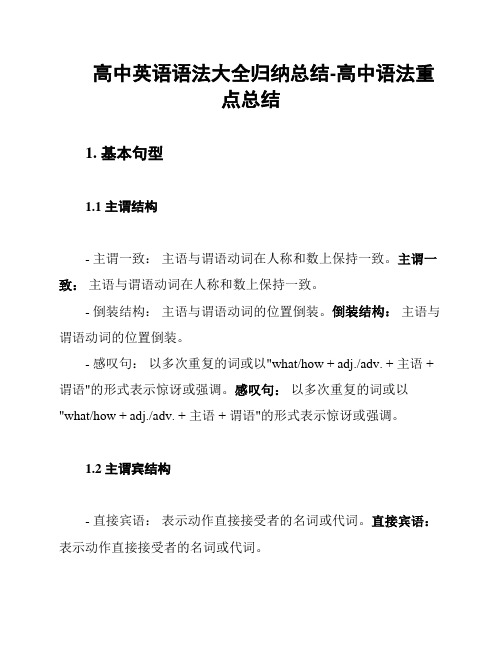
高中英语语法大全归纳总结-高中语法重点总结1. 基本句型1.1 主谓结构- 主谓一致:主语与谓语动词在人称和数上保持一致。
主谓一致:主语与谓语动词在人称和数上保持一致。
- 倒装结构:主语与谓语动词的位置倒装。
倒装结构:主语与谓语动词的位置倒装。
- 感叹句:以多次重复的词或以"what/how + adj./adv. + 主语 + 谓语"的形式表示惊讶或强调。
感叹句:以多次重复的词或以"what/how + adj./adv. + 主语 + 谓语"的形式表示惊讶或强调。
1.2 主谓宾结构- 直接宾语:表示动作直接接受者的名词或代词。
直接宾语:表示动作直接接受者的名词或代词。
- 间接宾语:用来表示动作接受者的人或者事物。
间接宾语:用来表示动作接受者的人或者事物。
- 宾语补足语:用来修饰宾语或者补充宾语的信息。
宾语补足语:用来修饰宾语或者补充宾语的信息。
1.3 主系表结构- 系动词:用来连接主语和表语的动词。
系动词:用来连接主语和表语的动词。
- 表语:用来说明主语状态、性质、特点等的名词、形容词、副词、介词短语等。
表语:用来说明主语状态、性质、特点等的名词、形容词、副词、介词短语等。
2. 时态和语态2.1 时态- 一般现在时:表示经常性、惯性的动作或状态。
一般现在时:表示经常性、习惯性的动作或状态。
- 一般过去时:表示在过去某个时间发生的动作或状态。
一般过去时:表示在过去某个时间发生的动作或状态。
- 一般将来时:表示将来某个时间会发生的动作或状态。
一般将来时:表示将来某个时间会发生的动作或状态。
- 现在进行时:表示正在进行的动作或状态。
现在进行时:表示正在进行的动作或状态。
- 过去进行时:表示过去某个时间正在进行的动作或状态。
过去进行时:表示过去某个时间正在进行的动作或状态。
- 现在完成时:表示过去发生但对现在仍有影响的动作或状态。
现在完成时:表示过去发生但对现在仍有影响的动作或状态。
高中必备的英语语法知识总结
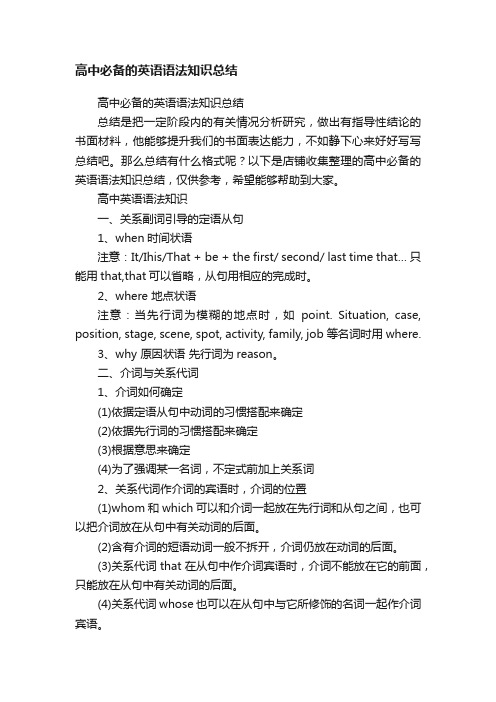
高中必备的英语语法知识总结高中必备的英语语法知识总结总结是把一定阶段内的有关情况分析研究,做出有指导性结论的书面材料,他能够提升我们的书面表达能力,不如静下心来好好写写总结吧。
那么总结有什么格式呢?以下是店铺收集整理的高中必备的英语语法知识总结,仅供参考,希望能够帮助到大家。
高中英语语法知识一、关系副词引导的定语从句1、when时间状语注意:It/Ihis/That + be + the first/ second/ last time that… 只能用that,that可以省略,从句用相应的完成时。
2、where 地点状语注意:当先行词为模糊的地点时,如point. Situation, case, position, stage, scene, spot, activity, family, job等名词时用where.3、why 原因状语先行词为reason。
二、介词与关系代词1、介词如何确定(1)依据定语从句中动词的习惯搭配来确定(2)依据先行词的习惯搭配来确定(3)根据意思来确定(4)为了强调某一名词,不定式前加上关系词2、关系代词作介词的宾语时,介词的位置(1)whom和which可以和介词一起放在先行词和从句之间,也可以把介词放在从句中有关动词的后面。
(2)含有介词的短语动词一般不拆开,介词仍放在动词的后面。
(3)关系代词that在从句中作介词宾语时,介词不能放在它的前面,只能放在从句中有关动词的后面。
(4)关系代词whose也可以在从句中与它所修饰的名词一起作介词宾语。
3、“名词/数词/代词+介词+关系代词”结构常见的形式有:名词/one/two/some/none/all/both/several/many/most/a few/a little/the+比较级/the+最高级…+of+which/whom。
高中英语知识重点一、时间状语从句1、when的用法(1)when既可引导一个持续性动作,也可引导一个短暂性动作,可用于表示主句和从句动作同时发生或从句动作先于主句动作,有时还可表示从句动作后于主句,意为“当……时候”。
高中英语语法必背基础知识点总结
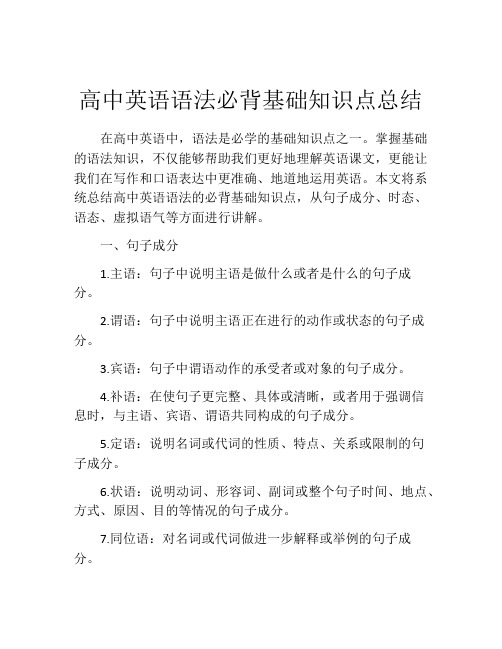
高中英语语法必背基础知识点总结在高中英语中,语法是必学的基础知识点之一。
掌握基础的语法知识,不仅能够帮助我们更好地理解英语课文,更能让我们在写作和口语表达中更准确、地道地运用英语。
本文将系统总结高中英语语法的必背基础知识点,从句子成分、时态、语态、虚拟语气等方面进行讲解。
一、句子成分1.主语:句子中说明主语是做什么或者是什么的句子成分。
2.谓语:句子中说明主语正在进行的动作或状态的句子成分。
3.宾语:句子中谓语动作的承受者或对象的句子成分。
4.补语:在使句子更完整、具体或清晰,或者用于强调信息时,与主语、宾语、谓语共同构成的句子成分。
5.定语:说明名词或代词的性质、特点、关系或限制的句子成分。
6.状语:说明动词、形容词、副词或整个句子时间、地点、方式、原因、目的等情况的句子成分。
7.同位语:对名词或代词做进一步解释或举例的句子成分。
8.插入语:用以强调某一句子成分或区分语气的句子成分。
二、时态时态是英语语法中的重要部分,是指一种动词变形形式,用来表示动作所发生的时间。
下面是高中英语中需要掌握的时态形式:1.现在时:表示正在进行的动作,或者表示客观真理、习惯性动作。
2.过去时:表示在过去完成或正在进行的动作。
3.将来时:表示将会发生的动作。
4.现在完成时:表示正在进行或刚刚完成的动作对现在造成的影响或结果。
5.过去完成时:表示在过去某个时间点前已经完成的动作。
6.将来完成时:表示将在某个时间点之前完成的动作。
7.过去进行时:表示过去某一时刻正在进行的动作。
8.现在进行时:表示现在正在进行的动作。
9.将来进行时:表示将来某个时间点正在进行的动作。
三、语态语态是指动词表示的“动作发生的意义”与“该动作与主语的关系”所产生的特殊形式。
英语中的语态主要分为:主动语态(the active voice)和被动语态(the passive voice)。
在高中英语中,我们需要掌握正确使用主动语态和被动语态的方法和规则,以便更好地理解和表达英语句子。
高中英语知识点总结归纳

高中英语知识点总结归纳一、语法知识点1. 时态- 一般现在时- 用法:表示经常发生的动作、存在的状态或客观事实、真理等。
例如:The earth moves around the sun.(客观真理)He often goes to school by bike.(经常发生的动作)- 结构:主语 + 动词原形(第三人称单数形式为动词 + s / es)。
例如:I play football every day. She studies hard.- 一般过去时- 用法:表示过去某个时间发生的动作或存在的状态。
例如:I saw him yesterday.- 结构:主语 + 动词的过去式。
规则动词的过去式变化有一定规律,如直接加 -ed(work - worked),以e结尾加 -d(live - lived)等;不规则动词需要单独记忆(如go - went,see - saw)。
- 一般将来时- 用法:表示将来某个时间要发生的动作或存在的状态。
例如:I will go to Beijing next week.- 结构:will + 动词原形或be going to + 动词原形。
be going to结构更强调计划、打算。
例如:He is going to study abroad.- 现在进行时- 用法:表示此时此刻正在进行的动作,也可表示现阶段正在进行的动作。
例如:Look! She is dancing.(此时此刻)He is writing a book these days.(现阶段)- 结构:主语 + be动词(am/is/are)+ 动词的 -ing形式。
- 过去进行时- 用法:表示过去某个时刻或某段时间正在进行的动作。
例如:At that time, I was reading a book.- 结构:主语 + was / were + 动词的 -ing形式。
- 现在完成时- 用法:表示过去发生的动作对现在造成的影响或结果,或表示从过去开始一直持续到现在的动作或状态。
高考英语语法知识点整理总结归纳

高考英语语法知识点整理总结归纳高考英语语法知识点整理总结归纳英语改错题目当中,连词错误,经常出现的是转折与承接的错误,也就是but与and应用错误,此外现在分词和过去分词的错误也是一直都出现的。
下面是小编为大家整理的高考英语语法知识点整理总结,希望对您有所帮助!高考英语语法知识点整理总结一、不定式做主语:1、不定式做主语一般表示具体的某次动作。
===动名词doing 表示习惯的,经常的动作。
e.g: To finish the building in a month is difficult.To do such things is foolish.To see is to believe. (对等)注: 1).不定式作主语时,谓语用单数2).当主语较长,谓语较短时,常用it做形式主语,而将不定式放到谓语的后面。
it做形式主语,不定式放在谓语动词之后常用于下列结构中:(1)It is/was +adj.+of sb. to do…(2) It is +adj.+for sb.+to do…It is easy / difficult / hard / foolish / unwise / right / wrong / unnecessary(3) it is +a +名词+ to do...It is a pity / a pleasure / a pleasant thing / one’s duty / an honor / a shame / a crime / no easy job… to doIt takes (sb.) some time / courage / patience …to do…It requires courage / patience / hard work… to do…注意: probable和possible均可作表语,但possible可以用不定式作真实主语,而probable不能用不定式作真实主语。
高中英语知识点总结
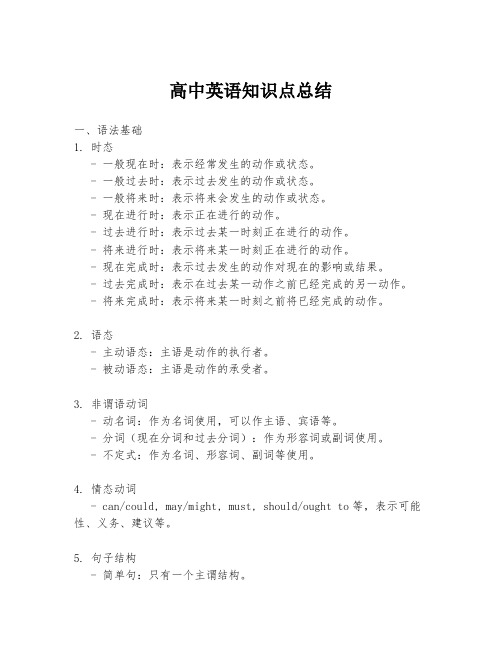
高中英语知识点总结一、语法基础1. 时态- 一般现在时:表示经常发生的动作或状态。
- 一般过去时:表示过去发生的动作或状态。
- 一般将来时:表示将来会发生的动作或状态。
- 现在进行时:表示正在进行的动作。
- 过去进行时:表示过去某一时刻正在进行的动作。
- 将来进行时:表示将来某一时刻正在进行的动作。
- 现在完成时:表示过去发生的动作对现在的影响或结果。
- 过去完成时:表示在过去某一动作之前已经完成的另一动作。
- 将来完成时:表示将来某一时刻之前将已经完成的动作。
2. 语态- 主动语态:主语是动作的执行者。
- 被动语态:主语是动作的承受者。
3. 非谓语动词- 动名词:作为名词使用,可以作主语、宾语等。
- 分词(现在分词和过去分词):作为形容词或副词使用。
- 不定式:作为名词、形容词、副词等使用。
4. 情态动词- can/could, may/might, must, should/ought to等,表示可能性、义务、建议等。
5. 句子结构- 简单句:只有一个主谓结构。
- 并列句:由两个或多个简单句通过并列连词连接。
- 复合句:包含一个主句和至少一个从句。
- 复杂句:包含一个主句和多个从句,至少有一个从句是嵌套的。
二、词汇与短语1. 基础词汇- 常用名词、动词、形容词、副词、代词等。
- 同义词、反义词、短语动词等。
2. 词组和习语- 常见短语动词:look after, take care of, give up等。
- 习语和俚语:break the ice, bite the bullet, hit the sack 等。
三、阅读理解1. 阅读技巧- 略读(skimming):快速获取文章大意。
- 扫读(scanning):寻找具体信息。
- 精读(intensive reading):深入理解文章内容。
2. 文章类型- 记叙文、议论文、说明文、应用文等。
3. 阅读理解策略- 预测:根据上下文预测内容。
高中英语语法知识点总结归纳

高中英语语法知识点总结归纳高中英语语法知识点总结归纳英语语法的确是一大难点,在语法学习中,学习者经常被某些语法术语所困扰。
不同的语法书和不同的语法学家经常使用不同的语法术语,这给英语学习者造成不少困难。
下面是小编为大家整理的高中英语语法知识点总结,希望对您有所帮助!高中英语语法知识点总结一、表语从句可以接表语从句的连系动词有be, look, remain, seem 等。
……数百万人死于由抽烟引起的疾病我们是否能赢得这次比赛值得注意的是:1. 表语从句的表现形式除了用从属连词,连接代词和连接副词引导以外,还可以由as, as if ,as though引导. It looks as if it is going to rain. 好象要下雨了。
2、另外还要注意以下常用的两种结构:The reason why…is that … (而不用because) It ( This, That ) is because… . 他为什么被开除是因为他工作不努力。
二、同位语从句同位语从句一般由 that, whether 等连词引导,常放在advice, doubt, fact, hope, idea, information, message, news, order, possibility, problem, question, reason, truth, word, suggestion.等名词的后面,说明该名词的具体内容。
登陆月球……. . ……什么时候回来 y也许病了三、宾语从句宾语从句可以作及物动词的宾语,介词的宾语,某些形容词的宾语以及非谓语动词的宾语。
1.及物动词后的宾语从句:a warm support……任何需要帮助的人…… 她为什么拒绝了我的邀请2.介词后的宾语从句:我总是在思考如何提高我的口语水平。
老师对他所说的话很满意。
3.某些形容词后的宾语从句:……通过努力工作,你将取得更大的进步…….他没有告别就走了4.非谓语动词后的宾语从句:Realizing that it was just a difference in custom, the foreigner smiled and said nothing.高中英语语法知识重点1、主语主语表示句子主要说明的人或事物,一般由名词,代词,数词,不定式等充当。
【高中英语】高中英语语法归纳总结 史上最全的英语语法来了
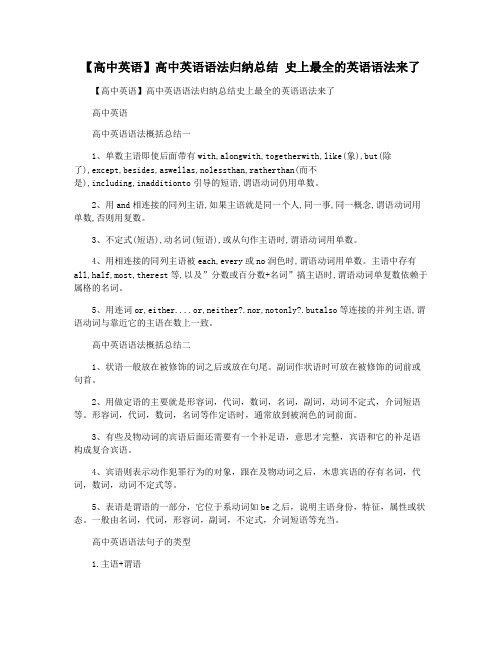
【高中英语】高中英语语法归纳总结史上最全的英语语法来了【高中英语】高中英语语法归纳总结史上最全的英语语法来了高中英语高中英语语法概括总结一1、单数主语即使后面带有with,alongwith,togetherwith,like(象),but(除了),except,besides,aswellas,nolessthan,ratherthan(而不是),including,inadditionto引导的短语,谓语动词仍用单数。
2、用and相连接的同列主语,如果主语就是同一个人,同一事,同一概念,谓语动词用单数,否则用复数。
3、不定式(短语),动名词(短语),或从句作主语时,谓语动词用单数。
4、用相连接的同列主语被each,every或no润色时,谓语动词用单数。
主语中存有all,half,most,therest等,以及”分数或百分数+名词”搞主语时,谓语动词单复数依赖于属格的名词。
5、用连词or,either....or,neither?.nor,notonly?.butalso等连接的并列主语,谓语动词与靠近它的主语在数上一致。
高中英语语法概括总结二1、状语一般放在被修饰的词之后或放在句尾。
副词作状语时可放在被修饰的词前或句首。
2、用做定语的主要就是形容词,代词,数词,名词,副词,动词不定式,介词短语等。
形容词,代词,数词,名词等作定语时,通常放到被润色的词前面。
3、有些及物动词的宾语后面还需要有一个补足语,意思才完整,宾语和它的补足语构成复合宾语。
4、宾语则表示动作犯罪行为的对象,跟在及物动词之后,木患宾语的存有名词,代词,数词,动词不定式等。
5、表语是谓语的一部分,它位于系动词如be之后,说明主语身份,特征,属性或状态。
一般由名词,代词,形容词,副词,不定式,介词短语等充当。
高中英语语法句子的类型1.主语+谓语2.主语+谓语+状语3.主语+谓语+宾语4.主语+系动词+未来式5.主语+谓语+间接宾语+直接宾语6.主语+谓语+轻易宾语+间接宾语7.主语+谓语+宾语+宾语补足语。
干货高中英语语法归纳总结大全,高考必备
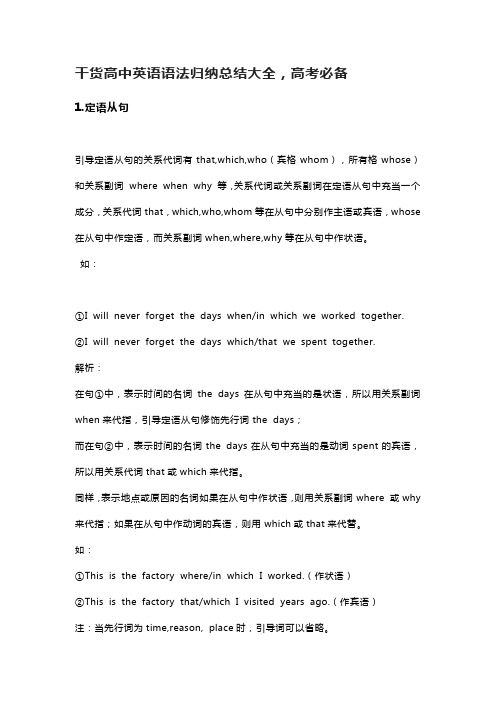
干货高中英语语法归纳总结大全,高考必备1.定语从句引导定语从句的关系代词有that,which,who(宾格whom),所有格whose)和关系副词where when why 等,关系代词或关系副词在定语从句中充当一个成分,关系代词that,which,who,whom等在从句中分别作主语或宾语,whose 在从句中作定语,而关系副词when,where,why等在从句中作状语。
如:①I will never forget the days when/in which we worked together.②I will never forget the days which/that we spent together.解析:在句①中,表示时间的名词the days在从句中充当的是状语,所以用关系副词when来代指,引导定语从句修饰先行词the days;而在句②中,表示时间的名词the days在从句中充当的是动词spent的宾语,所以用关系代词that或which来代指。
同样,表示地点或原因的名词如果在从句中作状语,则用关系副词where 或why 来代指;如果在从句中作动词的宾语,则用which或that来代替。
如:①This is the factory where/in which I worked.(作状语)②This is the factory that/which I visited years ago.(作宾语)注:当先行词为time,reason, place时,引导词可以省略。
①This was the first (when/what) I had serious trouble with my boss.②That is the reason (why) I did it.③This is the place (where) we met yesterday.另外,定语从句中谓语动词的数应与先行词的数相一致。
(完整版)高中英语重点语法知识汇总
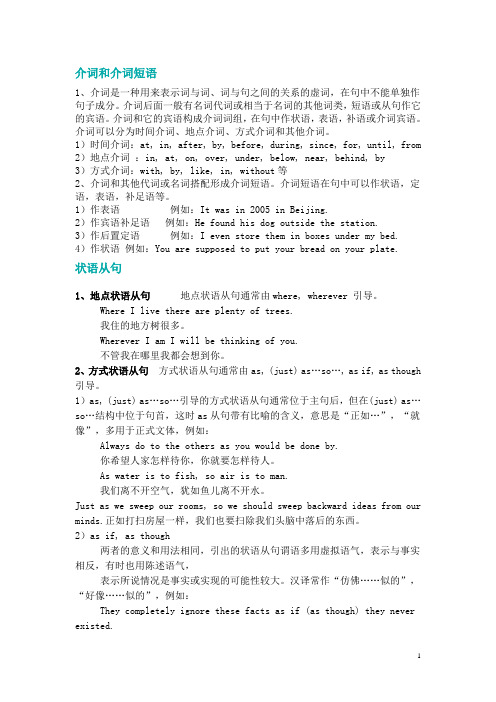
介词和介词短语1、介词是一种用来表示词与词、词与句之间的关系的虚词,在句中不能单独作句子成分。
介词后面一般有名词代词或相当于名词的其他词类,短语或从句作它的宾语。
介词和它的宾语构成介词词组,在句中作状语,表语,补语或介词宾语。
介词可以分为时间介词、地点介词、方式介词和其他介词。
1)时间介词:at, in, after, by, before, during, since, for, until, from 2)地点介词:in, at, on, over, under, below, near, behind, by3)方式介词:with, by, like, in, without等2、介词和其他代词或名词搭配形成介词短语。
介词短语在句中可以作状语,定语,表语,补足语等。
1)作表语例如:It was in 2005 in Beijing.2)作宾语补足语例如:He found his dog outside the station.3)作后置定语例如:I even store them in boxes under my bed. 4)作状语例如:You are supposed to put your bread on your plate.状语从句1、地点状语从句地点状语从句通常由where, wherever 引导。
Where I live there are plenty of trees.我住的地方树很多。
Wherever I am I will be thinking of you.不管我在哪里我都会想到你。
2、方式状语从句方式状语从句通常由as, (just) as…so…, as if, as though 引导。
1)as, (just) as…so…引导的方式状语从句通常位于主句后,但在(just) as…so…结构中位于句首,这时as从句带有比喻的含义,意思是“正如…”,“就像”,多用于正式文体,例如:Always do to the others as you would be done by.你希望人家怎样待你,你就要怎样待人。
高中英语语法点总结

高中英语语法点总结高中英语语法点总结高中英语语法点总结篇1(1)现在分词与过去分词作状语的区别。
现在分词做状语与过去分词做状语的最主要区别在于两者与所修饰的主语的主动与被动关系的区别。
1)现在分词作状语时,现在分词的动作就是句子主语的动作,它们之间的关系是主动关系。
He went out shutting the door behind him. 他出去后将门随手关上。
Not knowing what to do, he went to his parents for help. 由于不知如何办是好,他去找父母帮忙。
2)过去分词作状语时,过去分词表示的动作是句子主语承受的动作,它们之间的关系是被动关系。
Given more attention, the trees could have grown better. 如果对这些树多关心一些,它们本来会长得更好。
Faced with difficulties, we must try to overcome them. 在遇到困难的时候,我们必须设法克服。
(2)动词不定式和分词作状语的区别1)分词作状语一般表示伴随,而不定式常常表示目的。
They stood by the roadside talking about the plan.他们站在路边谈论着这个计划。
(伴随)They stood by the roadside to talk about the plan.他们站在路边为的是谈论这个计划。
(目的)2)分词作状语放在句子开头,除表示原因之外有时表示时间或条件。
动词不定式作状语时,除了表示目的以外,还表示结果或原因。
Reading attentively,he forgot the time for lunch.由于在专心读书,他忘了吃午饭的时间。
(原因)Reading carefully,he found something he had not knownbefore.他仔细读书时,发现了一些从前不知道的东西。
高中英语语法知识点归纳总结
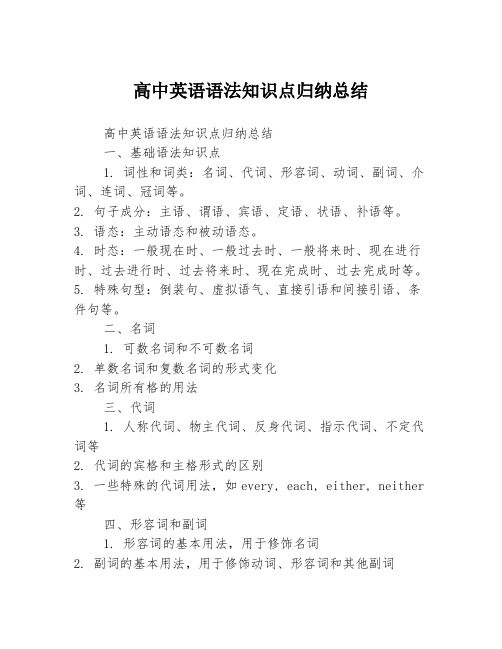
高中英语语法知识点归纳总结高中英语语法知识点归纳总结一、基础语法知识点1. 词性和词类:名词、代词、形容词、动词、副词、介词、连词、冠词等。
2. 句子成分:主语、谓语、宾语、定语、状语、补语等。
3. 语态:主动语态和被动语态。
4. 时态:一般现在时、一般过去时、一般将来时、现在进行时、过去进行时、过去将来时、现在完成时、过去完成时等。
5. 特殊句型:倒装句、虚拟语气、直接引语和间接引语、条件句等。
二、名词1. 可数名词和不可数名词2. 单数名词和复数名词的形式变化3. 名词所有格的用法三、代词1. 人称代词、物主代词、反身代词、指示代词、不定代词等2. 代词的宾格和主格形式的区别3. 一些特殊的代词用法,如every, each, either, neither 等四、形容词和副词1. 形容词的基本用法,用于修饰名词2. 副词的基本用法,用于修饰动词、形容词和其他副词3. 形容词和副词的比较级和最高级形式变化规则4. 有些形容词和副词的特殊用法,如good, well, bad, badly等五、动词1. 动词的基本用法,表示动作或状态2. 动词的时态和语态的变化3. 动词的不同形式:基本形、过去式、过去分词、现在分词等4. 动词的时态和动词短语的用法六、时态和语态1. 一般现在时2. 一般过去时3. 一般将来时4. 现在进行时5. 过去进行时6. 现在完成时7. 过去完成时8. 被动语态的构成和用法七、介词和介词短语1. 常见的介词和介词短语的用法2. 介词的时间、地点、方式、原因等用法八、连词1. 并列连词的用法,如and, or, but等2. 从属连词的用法,如because, if, when等九、冠词1. 定冠词和不定冠词的用法2. 前置冠词和后置冠词的用法十、句子结构和句型1. 主谓结构2. 主谓宾结构3. 主谓宾定结构4. 主系表结构5. 其他常见的句型,如感叹句、倒装句、祈使句等十一、其他语法知识点1. 形容词和副词的用法区别2. 名词的单复数规则3. 不定代词的用法4. 状语从句的用法5. 定语从句的用法6. 强调句的结构7. 虚拟语气的用法8. 间接引语的转换等以上是高中英语语法的基础知识点的归纳总结,希望能对你有所帮助。
高中英语语法大全知识点

高中英语语法大全知识点读书能获得知识;但更有用的知识对世界的认识却只能通过研究各种各样的人才能获得。
下面小编给大家分享一些高中英语语法大全知识,希望能够帮助大家,欢迎阅读!高中英语语法大全1简单句、并列句、复合句1. 简单句句型:主语+谓语只包含一个主谓结构,而句子的各个结构都只由单词或短语表示。
2. 并列句句型:简单句+并列连词(或连接副词)+简单句由两个或两个以上的简单句并列连接起来的句子叫并列句。
并列句中的各简单句意义同等重要,相互之间没有从属关系,是平行并列的关系。
它们之间用连词连结。
1、联合关系:常用的连词有and, not only…but(also), neither…nor等。
Eg. Tom doesn’t smoke, nor does his brother.2、转折关系常用的连词有but, yet, still, however, while(而,然而),when(那时,然后)等。
Eg. He got up very early, (and) yet he failed to catch the morning train.We played outside till sunset, when it began to rain.She is tired, (but) still she will make another test.yet 和still是连接副词,又叫半连接句。
however(然而,不过,但是)意义接近yet,可放在句首、句末或插入句子中间。
3、选择关系:常用的连词有or(或者,还是,否则),otherwise, or else,either…or等。
Eg. Hurry up, or we’ll be late for school.4、因果关系连词有:for, so, thus, therefore, and so 等。
Eg. He studied hard, thus he succeeded in passing the exam.The Frenchman coughed loudly, so he decided to go and get some medicine for it.for 表示附加或推断的理由、原因。
高中英语语法知识要点归纳总结

高中英语语法知识要点归纳总结英语语法在学习过程中是非常重要的,它对于提高英语语言能力至关重要。
在高中阶段,我们需要掌握一些基本的语法知识,以便更好地理解和运用英语。
本文将对高中英语语法的一些重点知识进行归纳总结,帮助大家更好地学习和掌握。
一、动词时态1. 一般现在时:表示经常性的动作或状况,句子结构为主语+动词原形。
例如:I play basketball every Sunday.2. 现在进行时:表示正在进行的动作,句子结构为主语+be动词+动词ing形式。
例如:She is reading a book right now.3. 一般过去时:表示过去发生的动作或状态,句子结构为主语+动词过去式。
例如:He played football yesterday.4. 过去进行时:表示过去某一时刻正在进行的动作,句子结构为主语+was/were+动词ing形式。
例如:They were studying English at 8 p.m. last night.5. 将来时:表示将来发生的动作或状态,句子结构为主语+will+动词原形。
例如:We will have a party next weekend.6. 现在完成时:表示过去发生的动作对现在造成的影响,句子结构为主语+have/has+过去分词。
例如:She has finished her homework.7. 过去完成时:表示过去某一时间或动作之前已经完成的动作,句子结构为主语+had+过去分词。
例如:He had already left when I arrived.二、名词1. 可数名词和不可数名词:可数名词有单数和复数形式,可与a/an和数字连用;不可数名词无复数形式,不能与a/an连用,只能与some或any连用。
例如:I have two apples. Can I have some water?2. 名词所有格:表示所属关系,通常在名词后面加's。
高中英语语法知识点总结
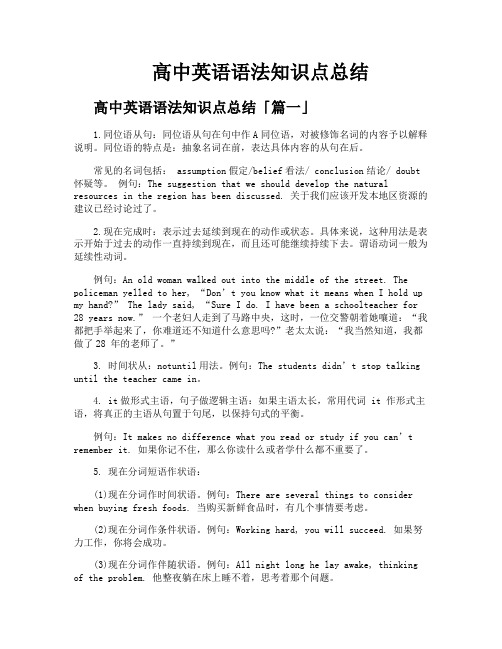
高中英语语法知识点总结高中英语语法知识点总结「篇一」1.同位语从句:同位语从句在句中作A同位语,对被修饰名词的内容予以解释说明。
同位语的特点是:抽象名词在前,表达具体内容的从句在后。
常见的名词包括: assumption假定/belief看法/ conclusion结论/ doubt 怀疑等。
例句:The suggestion that we should develop the natural resources in the region has been discussed. 关于我们应该开发本地区资源的建议已经讨论过了。
2.现在完成时:表示过去延续到现在的动作或状态。
具体来说,这种用法是表示开始于过去的动作一直持续到现在,而且还可能继续持续下去。
谓语动词一般为延续性动词。
例句:An old woman walked out into the middle of the street. The policeman yelled to her, “Don’t you know what it means when I hold up my hand?” The lady said, “Sure I do. I have been a schoolteacher for 28 years now.” 一个老妇人走到了马路中央,这时,一位交警朝着她嚷道:“我都把手举起来了,你难道还不知道什么意思吗?”老太太说:“我当然知道,我都做了28 年的老师了。
”3. 时间状从:notuntil用法。
例句:The students didn’t stop talking until the teacher came in。
4. it做形式主语,句子做逻辑主语:如果主语太长,常用代词 it 作形式主语,将真正的主语从句置于句尾,以保持句式的平衡。
例句:It makes no difference what you read or study if you can’t remember it. 如果你记不住,那么你读什么或者学什么都不重要了。
高中英语语法大全
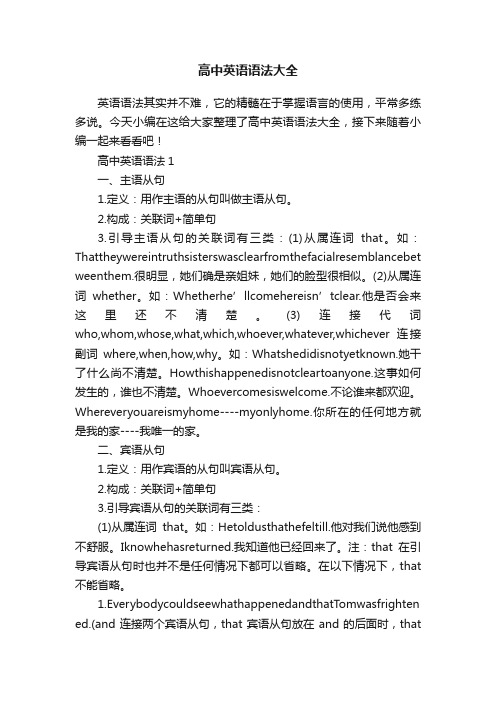
高中英语语法大全英语语法其实并不难,它的精髓在于掌握语言的使用,平常多练多说。
今天小编在这给大家整理了高中英语语法大全,接下来随着小编一起来看看吧!高中英语语法1一、主语从句1.定义:用作主语的从句叫做主语从句。
2.构成:关联词+简单句3.引导主语从句的关联词有三类:(1)从属连词that。
如:Thattheywereintruthsisterswasclearfromthefacialresemblancebet weenthem.很明显,她们确是亲姐妹,她们的脸型很相似。
(2)从属连词whether。
如:Whetherhe’llcomehereisn’tclear.他是否会来这里还不清楚。
(3)连接代词who,whom,whose,what,which,whoever,whatever,whichever连接副词where,when,how,why。
如:Whatshedidisnotyetknown.她干了什么尚不清楚。
Howthishappenedisnotcleartoanyone.这事如何发生的,谁也不清楚。
Whoevercomesiswelcome.不论谁来都欢迎。
Whereveryouareismyhome----myonlyhome.你所在的任何地方就是我的家----我唯一的家。
二、宾语从句1.定义:用作宾语的从句叫宾语从句。
2.构成:关联词+简单句3.引导宾语从句的关联词有三类:(1)从属连词that。
如:Hetoldusthathefeltill.他对我们说他感到不舒服。
Iknowhehasreturned.我知道他已经回来了。
注:that在引导宾语从句时也并不是任何情况下都可以省略。
在以下情况下,that 不能省略。
1.EverybodycouldseewhathappenedandthatTomwasfrighten ed.(and连接两个宾语从句,that宾语从句放在and的后面时,that不能省略。
高中英语语法总结大全完整版

高中英语语法大全词法第1章主谓一致一.概念:主谓一致是指:1)语法形式上要一致,即单复数形式与谓语要一致。
2)意义上要一致,即主语意义上的单复数要与谓语的单复数形式一致。
3)就近原则,即谓语动词的单复形式取决于最靠近它的词语,一般来说,不可数名词用动词单数,可数名词复数用动词复数。
例如:There is much water in the thermos.但当不可数名词前有表示数量的复数名词时,谓语动词用复数形式。
例如:Ten thousand tons of coal were produced last year.二.相关知识点精讲1.并列结构作主语时谓语用复数,例如:Reading and writing are very important. 读写很重要。
注意:当主语由and连结时,如果它表示一个单一的概念,即指同一人或同一物时,谓语动词用单数,and 此时连接的两个词前只有一个冠词。
例如:The iron and steel industry is very important to our life. 钢铁工业对我们的生活有重要意义。
典型例题The League secretary and monitor ___ asked to make a speech at the meeting.A. isB. wasC. areD. were答案B. 注:先从时态上考虑。
这是过去发生的事情应用过去时,先排除A.,C。
本题易误选D,因为The League secretary and monitor 好象是两个人,但仔细辨别,monitor 前没有the,在英语中,当一人兼数职时只在第一个职务前加定冠词。
后面的职务用and 相连。
这样本题主语为一个人,所以应选B。
2. 主谓一致中的靠近原则1)当there be 句型的主语是一系列事物时,谓语应与最邻近的主语保持一致。
例如:There is a pen, a knife and several books on the desk. 桌上有一支笔、一把小刀和几本书。
高中英语的语法知识点总结

高中英语的语法知识点总结知识是静态的,人有了知识,还应该明白如何正确地将所掌握的知识在实践中加以应用,没有智慧,充其量不过是一本记载着知识的书。
下面小编给大家分享一些高中英语的语法知识点总结,希望能够帮助大家,欢迎阅读!高中英语的语法知识点1主谓一致用法总结主谓一致的概念主谓一致是指“人称”和“数”方面的一致关系。
一般情况下,主谓之间的一致关系由以下三个原则支配:语法一致原则意义一致原则就近原则“主谓一致”考查内容涉及名词单数或复数作主语、不可数名词作主语、不定式作主语、并列结构作主语、特殊名词作主语时与谓语动词的一致等。
名词作主语01某些集体名词,如family,team等作主语时,如果作为一个整体看待,谓语动词用单数形式,如果就其中一个个成员而言,谓语动词用复数形式。
如:His family is a happy one.他的家庭是一个幸福的家庭。
The whole family are watching TV.全家人都在看电视。
这类名词有audience,class,club,company,crew,enemy,crowd,government,group,party,public,team等。
名词population一词的使用情况类似。
“a group(crowd) of + 复数名词”等短语之后的谓语动词也同样可用单数或复数,前者强调整体,后者强调各个部分。
02某些集体名词,如people,police,cattle等,只当复数看待,谓语动词必须用复数。
The police are searching for the thief.警察正在搜捕那个贼。
03单、复数同形的名词作主语时,谓语动词应根据意义决定单、复数。
如:A sheep is over there.那边有只羊。
Some sheep are over there.那边有些羊。
04名词所有格之后的名词被省略,这种情况一般只指商店、工厂、住宅等,作主语时,动词一般用单数。
- 1、下载文档前请自行甄别文档内容的完整性,平台不提供额外的编辑、内容补充、找答案等附加服务。
- 2、"仅部分预览"的文档,不可在线预览部分如存在完整性等问题,可反馈申请退款(可完整预览的文档不适用该条件!)。
- 3、如文档侵犯您的权益,请联系客服反馈,我们会尽快为您处理(人工客服工作时间:9:00-18:30)。
高中英语重点语法汇总(附图表)英语常用的句型结构1、S + vi2、S + link verb + predicative3、S + vt +o4、S + vt + o (间接) + o (直接)5、S +vt+ o + o c6、There be + s + …简单句的五个基本句型种类句型主语S.谓语部分谓语动词V. 表语P. 宾语O.宾语补足语OC.第1种S +V We work.(不及物)第2种S+V+O He plays(及物) the piano. 第3种S+V+P We are(系动词) students.第4种S+V+ino(间接宾语)+Do(直接宾语)She gave(及物) me a pen.第5种S+V+O+C He made(及物) the boy laugh. 第6种There be+S There are thirty days this month.主语部分谓语部分谓语动词修饰语/补语/宾语1.2.3.FlowersFlowersMany beautiful flowersIBetty, your younger sister,Some students in my classbloom。
bloombloomin the gardens.in the gardens in spring.4.5.6.7.8.you(You)golooksspeakDo...understandReadto school by bicycle every day.very pretty.English very well.these sentences?Lesson Two, Mary.不绵羊2010-05-24 13:26简单句、并列句、复合句1. 简单句句型:主语+谓语只包含一个主谓结构,而句子的各个结构都只由单词或短语表示。
2. 并列句句型:简单句+并列连词(或连接副词)+简单句*由两个或两个以上的简单句并列连接起来的句子叫并列句。
并列句中的各简单句意义同等重要,相互之间没有从属关系,是平行并列的关系。
它们之间用连词连结。
1、联合关系:常用的连词有and, not only…but(also), neither…nor等。
Eg. Tom doesn’t smoke, nor does his brother.2、转折关系常用的连词有but, yet, still, however, while(而,然而),when(那时,然后)等。
Eg. He got up very early, (and) yet he failed to catch the morning train.We played outside till sunset, when it began to rain.She is tired, (but) still she will make another test.*yet 和still是连接副词,又叫半连接句。
*however(然而,不过,但是)意义接近yet,可放在句首、句末或插入句子中间。
3、选择关系:常用的连词有or(或者,还是,否则),otherwise, or else, either…or等。
Eg. Hurry up, or we’ll be late for school.4、因果关系连词有:for, so, thus, therefore, and so 等。
Eg. He studied hard, thus he succeeded in passing the exam.The Frenchman coughed loudly, so he decided to go and get some medicine for it.*for 表示附加或推断的理由、原因。
Therefore较so更正式,and so 较口语化。
3. 复合句句型:主句+连词+从句;或连词+从句+主句(包含一个主句、一个或一个以上的从句,或只包含一个从句,但有两个或两个以上的主句的句子叫复合句。
)1.一般现在时表示经常发生、习惯性动作、客观真理、科学事实、格言,目前的特征、状态、能力等。
2.主句是一般将来时,时间、条件状语从句中用一般现在时表示将来。
如:I’ll go there after I finish my work./ If it rains tomorrow, I won’t go there.3.在以here, there开头的句子里,go, come等少数动词的一般在时表示正在发生的动作。
例如:There goes the bell.铃响了。
There comes the bus.汽车来了。
Here she comes.她来了。
二、现在进行时1.表示正在进行的动作。
2.表示按计划安排即将发生的动作。
例如:She is leaving for Beijing.她要去北京。
He is working as a teacher tomorrow.从明天起他要做老师。
My father is coming to see me this Saturday.这个星期六我爸爸要来看我。
3.代替一般现在时,描绘更加生动。
例如:The Changjiang River is flowing into the east.江水滚滚向东流。
The sun is rising in the east.太阳从东方冉冉升起。
4.大多数动词可用于进行时,但也有些动词不用于进行时。
常见的有:exist, live, understand, mean, owe, belong to, know, doubt, suppose, remember, forget, believe,trust,want,wish,refuse,like,hate,dislike,prefer,mind,hope等。
三、现在完成时1.表示过去发生的动作对现在产生的影响或结果,或说话时已完成的动作。
例如:I have finished the report./ She has cleaned the room.2.表示从过去开始,待续到现在的动作或状态,往往和“for…”, “since…”表述的一段时间状语连用。
例如:He has learned English for six years./ They have worked here since they left college.3.现在完成时与一般过去时的区别:1)用两种时态来表述发生在过去的某一动作,现在完成时强调这一过去动作对现在产生的影响或结果,而一般过去时只表达过去的动作或状态,和现在关系不大。
例如:She has cleaned the room. It’s very clean now.(此句has cleaned就不能改为cleaned.一是因为cleaned与现状无关,二是因为一般过去时不可突然跳到It’s…这样的一般现在时。
)2)汉语中的“了”、“过”、“曾”等词常用完成表达,如:I have seen that film.(我看过那部电影了。
)但是如果是在特定的过去时间“看了”、“做过”,就不可用完成时而必须用一般过去进来表达。
例如:When did you see that film? I saw it yesterday.(你什么时候看了那部电影?我昨天看的。
)不能说:When have you seen that film? I have seen it yesterday.4.表示“曾经到过某地(人已回来)”用“have/has been to”,表示“到某地去了(还未回来)”用“have/has gone to”.例如:——Where is Li Hua? -He has gone to the reading-room.——She knows a lot about Shanghai.-She has been there.5.短暂动词(即瞬间动词),join, lose, buy, borrow, leave, go, come, arrive, die, marry, finish, complete, begin, start, break out等,在完成时态中,其肯定式不能和表示一段时间的状语连用。
例如不能说:He has finished the work for three hours.要翻译“他已完成工作三小时了。
”可采用1)“ago法”:He finished the work three hours ago.2)“延续法”:He has been through(with)the work for three hours.3)“since法”:It is/has been three hours since he finished the work.四、现在完成进行时1.用来表示从过去某一时刻开始一直持续到现在(或今后还要继续一去)的动作。
例如:He has been doing the maths problems since 8:00./ It has been raining for two days.2.凡是不能用于现在进行时的动词均不能用于现成完成进行时。
五、一般过去时表达特定的过去时间内发生的动作或存在的状况,或过去某一时间内经常发生或反复发生的动作或行为。
六、过去进行时1.表示过去某一时刻或某一段时间内正在进行的动作(这一过去时间须用时间状语表示)。
例如:He was preparing his lecture all day yesterday.2.表示动作在另一过去动作发生时进行。
例如:They were still working whenI left.3.用在两个过去进行时动作同时发生。
例如:I was writing while he was watching TV.4.表示过去将来动作。
例如:He said she was arriving the next day.七、过去完成时1.表示在过去某一时间以前已经完成的动作。
例如:He had shut the door before the dog came up./ Everything had been all right up till this morning.2.表示动作或状态从过去某个时刻开始一直延续到另一个过去时刻才完成,甚至还要继续下去。
例如:At the age of ten, he had learned 500 English words. He had been ill for a week when we learned about it.3.常用hope, expect, think, intend, want, suppose等动词的过去完成时来表示未实现的希望、打算或意图。
